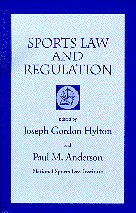Sports Law and Regulation. Edited by Joseph Gordon Hylton and Paul M. Anderson. ISBN 0-87462-006-6. 588 pages. Paper. See note below for sales of this book.
About Sports Law and Regulation
No one can be a fan of modern sports without some awareness of sports law. The time when umpires, coaches, and league commissioners had the final say over sports disputes has long passed, and disagreements from every sport, amateur and professional, end up in the courtroom with a regularity that many find depressing. Today the effective management of any sporting enterprise requires a familiarity with the legal principles governing sports which have been developed by courts over the past three decades.
While most fans are aware that legal rulings shape the games they watch on the field, few individuals-even those with legal training-understand how or on what basis sports-related cases are decided. The behind the scenes interactions between labor, management, and government in the arena of professional sports and between athletes, colleges and high schools, international sanctioning bodies, and attorneys often seem unfathomable, particularly when its comes to the legal nuances that are critical to the resolution of so many matters.
Sports Law and Regulation is designed to alleviate some of this uncertainty. The essays in this collection explore the intersection between law and sport in a variety of contexts. Topics covered include the geographic mobility of sports teams; stadium and arena management, the power of teams to discipline their players; intellectual property in sports; the rights of disabled athletes; player-coach and play-agent relationships; the structure of intercollegiate athletics; women athletes and gender equity; race and sports; and sports ethics. Each essay is written with the idea of making the law of sports more accessible to the interested reader.
For the sports fan trying to learn more about the legal side of sports or a lawyer considering a sports law practice, Sports Law and Regulation provides an illuminating, and sometimes provocative, introduction to the field.
JOSEPH GORDON HYLTON is Associate Professor of Law and Adjunct Professor of History at Marquette University. From 1997-1999, he served as the Interim Director of the National Sports Law Institute. PAUL M. ANDERSON is the Assistant Director of the National Sports Law Institute and an Adjunct Assistant Professor of Law at Marquette University.
Contents
Introduction 5
Acknowledgements 9
Part I: Sports Franchise Issues
1. Squeeze Play: The Game of Owners, Cities, Leagues and Congress: John Wunderli 13
2. Fair Or Foul? The Survival Of Small-Market Teams In Major League Baseball: Kevin E. Martens 55
3. Planning For Effective Risk Management: A Guide For Stadium And Arena Management: Bernard P. Maloy 111
Part II: Labor and Disciplinary Issues
4. Player Discipline in Team Sports: Jan Stiglitz 129
5. Sudden Death: League Labor Disputes, Sports Licensing and Force Majeure Neglect: Gary D. Way 155
6. Why is the PGA Teed Off at Casey Martin? An Example of How the Americans With Disabilities Act (ADA) Has Changed Sports Law: W. Kent Davis 197
Part III: Sports Contracts
7. College Coaching Contracts: A Practical Perspective: Martin J. Greenberg 247
8. The Art Of Contract Negotiation: David B. Falk 331
Part IV: Amateur & Intercollegiate Sports
9. A Comprehensive Blueprint for the Reform of Intercollegiate Athletics: Raymond L. Yasser 363
10. Enhanced Risk of Harm to One’s Self as a Justification for Exclusion from Athletics: Matthew J. Mitten 403
11. Gender Equity In Athletics: Coming of Age in the 90s: T. Jesse Wilde 441
Part V: Perspectives
12. Performing in a Racially Hostile Environment: Phoebe Weaver Williams 491
13. Racism in Sports: A Question of Ethics:
Paul M. Anderson 523
Index 579
About the Editors and Contributors 583
About the National Sports Law Institute 585
IMPORTANT NOTE
All sales for this book are being handled directly by the National Sports Law Institute of the Marquette University Law School.
$24.95 + $5 first class shipping.
Phone (414) 288-5815
Fax (414) 288-5818
E-mail






